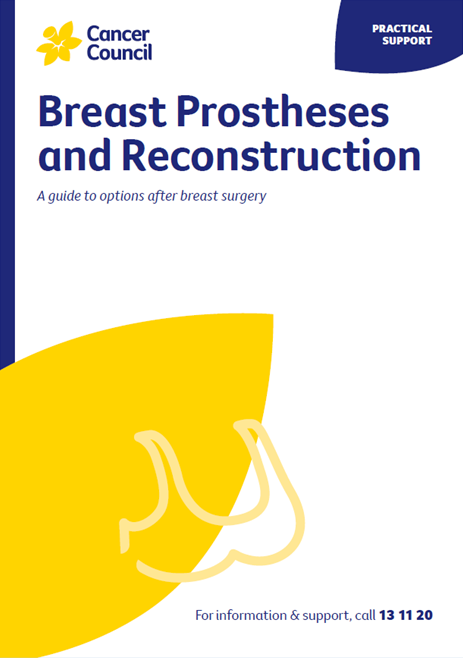- Home
- About Cancer
- Managing side effects
- Breast prostheses and reconstruction
- Looking after yourself
- Sexuality and intimacy
Sexuality and intimacy after breast cancer surgery
Having treatment for breast cancer may affect your sexuality.
Learn more about:
- Resuming sexual activity
- What if I don’t have a partner?
- How to manage changes in sexuality and intimacy
Resuming sexual activity
Some women find it may be a while before they feel like resuming sexual activity after treatment for cancer – you may need to recover from the operation and get used to wearing a prosthesis or having a reconstructed breast.
Things that lift your overall wellbeing, like eating well, exercising and relaxing, will help to boost your sexual confidence.
If you have a partner, you may be concerned about their reaction to the prosthesis or reconstruction. You may feel nervous or uncomfortable about your partner seeing you naked or you may worry that they’ll find you unattractive. You may want to talk to your partner about the changes while you’re in the hospital rather than the more intimate environment of your home.
It will take time to get used to how your body has changed. Some women may miss the pleasure they felt from the breast or nipple being stroked or kissed during sex. This may be the case even if you have a reconstruction. If breast stimulation was important to arousal before surgery, you may need to explore other ways of becoming aroused.
Some women try to avoid sexual contact, but this may not be satisfying for you and your partner. Although it may be difficult, discuss your fears and needs together. How you choose to approach intimacy depends on what suits you both. Learn some tips on managing changes to sexuality.
For more on this, see Sexuality, intimacy and cancer.
What if I don’t have a partner?
If you don’t have a partner, you might be anxious or uncertain about forming new relationships. If you meet someone new, you might worry about when and how to tell them that you’re wearing a breast prosthesis, have scars or have a reconstructed breast – and you may worry about how they may react.
It isn’t easy to decide when to tell a potential partner about any changes to your body. It’s natural to be worried about their reaction to seeing you naked for the first time.
Take your time and let a new partner know about the changes to your body when you feel ready. Practising what to say, before you talk to them, may help. You might want to show the other person how your body has changed before any sexual activity so that you can both get used to how that makes you feel. Do what feels right for you.
If a new relationship doesn’t work out, don’t automatically blame the cancer or how your body has changed. Relationships can end for a variety of reasons.
You might find it helpful to talk through any concerns you have about meeting someone new. Call Cancer Council 13 11 20 for information on support services. You can also talk to a counsellor or psychologist, your breast care nurse or your GP about your feelings.
How to manage changes in sexuality and intimacy
- If you are using a prosthesis, wear it in an attractive bra or camisole.
- Wear lingerie or a camisole, or drape a scarf or sarong over your scars, if you are self-conscious.
- Touch, hold, hug, massage and caress your partner to reassure each other of your love and attraction.
- Be open about what you are comfortable with. You might not be ready for your breast area to be touched, or you may want your partner to specifically touch this area.
- Dim or turn off the lights if you prefer.
- Talk to your doctor, your breast care nurse or a counsellor about any ongoing problems.
- See Sexuality, intimacy and cancer and LGBTQI+ people and cancer.
→ READ MORE: Support and information
We’ve become more intimate on other non-sexual levels. Cancer has opened up a whole lot of things, quite surprisingly.
Kerry
Podcast: Sex and Cancer
Listen to more of our podcast for people affected by cancer
More resources
Dr Jane O’Brien, Specialist Oncoplastic Breast Cancer Surgeon, St Vincent’s Private Hospital, VIC; Clare Bradshaw, Clinical Nurse Consultant, Breast Assessment Unit, Fiona Stanley Hospital, WA; Rene Hahn, Consumer; Sinead Hanley, Consumer; Dr Marc Langbart, Specialist Plastic and Reconstructive Surgeon, Randwick Plastic Surgery, NSW; Melanie Law, Consumer; Sally Levy, Consumer; Annmaree Mitchell, Consumer; Ashleigh Mondolo, Breast Cancer Nurse Clinical Consultant, Mater Private Hospital Brisbane, QLD; Rochelle Osgood, Clinical Nurse Consultant – McGrath Breast Care Nurse, Sunshine Coast University Hospital, QLD: Dr Kallyani Ponniah, Head of Department, Breast Centre, Sir Charles Gairdner Hospital, WA; Meg Rynderman OAM, Consumer; Sarah Stewart, Breast Care Nurse, The Royal Women’s Hospital, VIC; Erin Tidball, 13 11 20 Consultant, Cancer Council NSW; Jane Turner, Senior Exercise Physiologist, Sydney Cancer Survivorship Centre, Concord Cancer Centre, NSW.
View the Cancer Council NSW editorial policy.
View all publications or call 13 11 20 for free printed copies.

